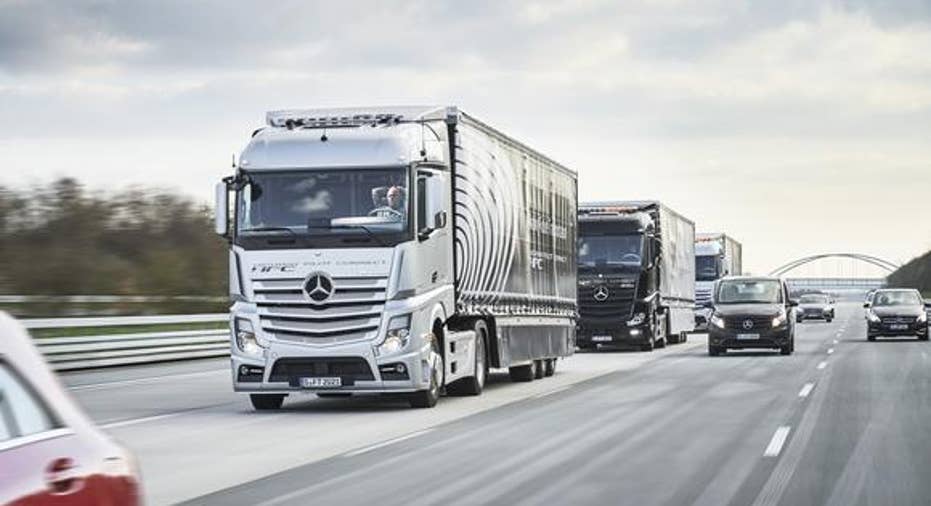Mercedes-Benz Is Leading Another Self-Driving Revolution: Big Trucks

A convoy of three digitally connected Mercedes-Benz trucks began a demonstrationjourney from Stuttgart to Rotterdam on Monday. Note the position of the lead driver's arms: The trucks are self-driving. Image source: Daimler.
German auto- and truck-maker Daimler said on Monday that three digitally connected and self-driving Mercedes-Benz trucks had begun a convoy drive from the German city of Stuttgart to Rotterdam, in the Netherlands.
The demonstration is part of a European challenge to foster development of "platooning," the partial automation of convoys of tractor-trailers to save fuel, reduce emissions, and increase highway safety.
But it also shows, in vivid detail, just how advanced Mercedes' self-driving technology is right now.
An interconnected convoy of self-driving tractor-trailers In addition to its well-known Mercedes-Benz cars, Daimler also has a significant truck and bus business. It builds and sells heavy-duty trucks (think tractor-trailers) under the Mercedes-Benz, Western Star, and Freightliner brands; medium-duty Fuso trucks, and Setra and Thomas Built buses.
Mercedes-Benz has already positioned itself as a leader in the race to self-driving cars. Monday's demonstration showed that it's determined to be a leader in self-driving trucks, too.
The company began demonstrating a partial self-driving system for its big tractor-trailers, called Highway Pilot, in 2014. While it requires the presence of a driver, who has to take the wheel in some circumstances (think inclement weather, or tight maneuvers on side roads), the Highway Pilot system automates the truck's acceleration and much of its cruising, increasing safety and reducing diesel-fuel consumption (and thus emissions).
Daimler has years of testing ahead before it brings the the Highway Pilot system to the global market, but it's already approved for use on highways throughout Germany. Now, Daimler is taking its system another step further with what it calls Highway Pilot Connect, which allows two or more Mercedes-Benz tractor-trailers to hook up in an automated convoy via automated vehicle-to-vehicle, or V2V, communication.
This graphic shows how Daimler's Highway Pilot Connect system works. Image source: Daimler.
In an automated truck convoy, or platoon, the lead truck does the driving while the others automatically follow at a precise distance (15 meters), braking or accelerating in tandem with the lead truck. That gives the trucks as a group an aerodynamic advantage, whichhelps save fuel -- as does the automated acceleration.Daimler says that putting trucks in an automated platoon can reduce fuel consumption (and emissions) by up to 7%, while taking up just half of the highway space that the trucks would take up on their own.
Mercedes may be leading the self-driving truck raceDaimler wasn't the only company showing off its platooning technology on Monday. Volkswagen's two heavy truck units, MAN Group and Scania, are also running convoys of V2V-connected trucks to Rotterdam as part of the challenge. But the Mercedes-Benz entry is significant simply because the lead truck in its platoon will largely be driving itself (and its two platoon-mates).
Daimler's Highway Pilot Connect still needs hundreds of thousands of miles of testing and probablyseveral years of refinement before it's ready for the global market. But for investors looking for ways to invest in our self-driving future, it's worth nothing that Mercedes-Benz cars aren't the only Daimler products in the forefront of the self-driving race.
The article Mercedes-Benz Is Leading Another Self-Driving Revolution: Big Trucks originally appeared on Fool.com.
John Rosevear has no position in any stocks mentioned. The Motley Fool has no position in any of the stocks mentioned. Try any of our Foolish newsletter services free for 30 days. We Fools may not all hold the same opinions, but we all believe that considering a diverse range of insights makes us better investors. The Motley Fool has a disclosure policy.
Copyright 1995 - 2016 The Motley Fool, LLC. All rights reserved. The Motley Fool has a disclosure policy.



















